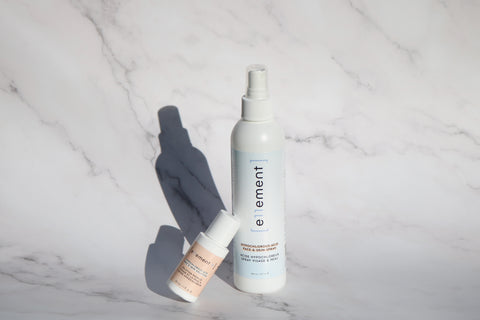There are plenty of acids to pick from in the skin care world, but one buzzy one has been standing out from the bunch: hypochlorous acid. From healing wounds to reducing harmful bacteria, this buzz-worthy ingredient fights off acne, rosacea, and much more. Its disinfecting properties are even 100 times stronger than bleach, according to Rachel Lee Lozina, licensed esthetician and founder of Blue Water Spa. We talked to the best board-certified dermatologists and an esthetician to learn all about hypochlorous acid, its benefits, and how to incorporate this ingredient into your skin care routine.
What Is Hypochlorous Acid?
Hypochlorous acid is a multi-use ingredient. "Hypochlorous acid can be found naturally in the body, particularly in the white blood cells, to help fight against foreign bodies and bacteria. It is made up of hydrogen, oxygen, and chloride, offering antimicrobial and anti-inflammatory benefits," explains Dr. Marisa Garshick, MD, FAAD, board-certified dermatologist. The anti-inflammatory and antibacterial benefits address skin conditions such as acne, folliculitis, eczema, and more.
One of the popular reasons people turn to hypochlorous acid in their skin care routine is to treat acne. "It's gaining a lot of buzz in the skincare community for being a superhero in the war against acne," says Lozina.

8 Ingredients You Should Use If You Have Eczema
Hypochlorous Acid Benefits
This buzz-worthy ingredient tackles all sorts of skin care concerns. A major perk: wound healing. This applies to healing many skin conditions and reduces the skin bacteria. "By removing the organisms that contribute to inflammation and skin barrier disruption, it helps heal the skin. It’s safe and gentle making it a great option for wounds and skin conditions like eczema," explains Azadeh Shirazi, MD, board-certified dermatologist.
For those battling breakouts, hypochlorous acid breaks down and slows the growth of harmful bacteria that causes acne. When hypochlorous acid is applied to acne, the bacteria cannot survive, says Lozina. In addition to treating an acne outbreak, it can also kill harmful bacteria surrounding the breakouts, preventing the spread of acne.
How to Use Hypochlorous Acid
Hypochlorous acid is super easy to add into your routine. This skin care ingredient comes mostly in spray form, making it a simple application. "It is best to apply after cleansing, prior to any serums or moisturizers, and can be applied mid-day over makeup or post-workout," explains Dr. Garshick. This product also doubles as a facial cleanser on the go. Booked and busy for a mid-day workout? Spray hypochlorous acid on your skin to clean the skin and prevent harmful bacteria.
This ingredient is especially useful in the cooler, winter months because it can help deal with the stress that cold weather places on the skin. (Think a healthier skin barrier, soothed skin, and reduced irritation.) Hypochlorous acid is gentle on the skin and non-irritating, so this ingredient is generally safe for routine use, notes Dr. Garshick.
Side Effects of Hypochlorous Acid
“Just like with any product, some people may react poorly to hypochlorous acid. Dryness, irritation, and itching are reported side effects to the ingredient,” says Lozina. Avoid overusing hypochlorous acid with exfoliating products and other strong skin care ingredients.
Bottom line: If using hypochlorous acid correctly, it is easy to tolerate without many side effects, says Dr. Garshick. "Be cautious of over using this ingredient particularly in combination with other toners or antibacterial products," explains Dr. Shirazi. Stick to gentle cleansers and skin care products when using hypochlorous acid in your routine.
Conclusion:
In the realm of skincare, hypochlorous acid emerges as a potent yet gentle ingredient offering a plethora of benefits. Dr. Marisa Garshick highlights its natural occurrence in the body, underscoring its antimicrobial and anti-inflammatory prowess. From combating acne to soothing eczema, its versatility makes it a staple for various skin conditions.























